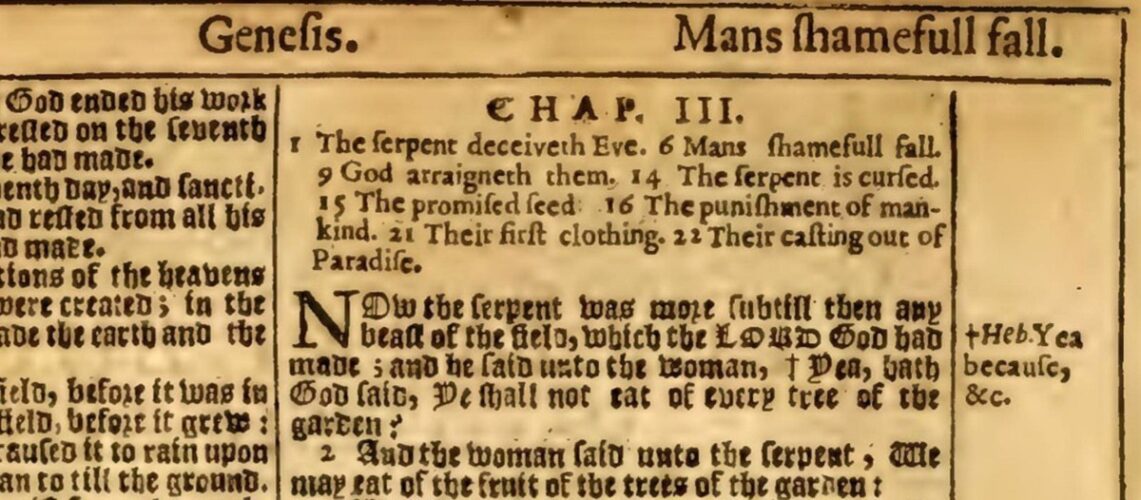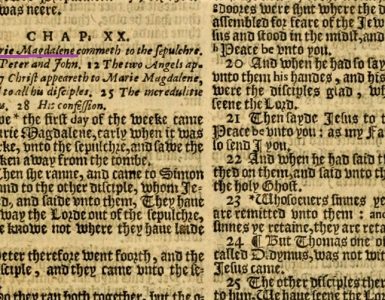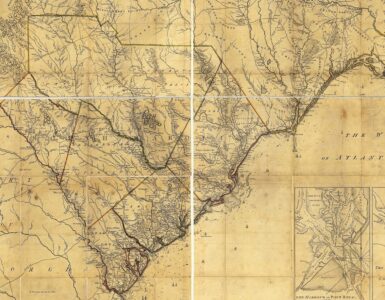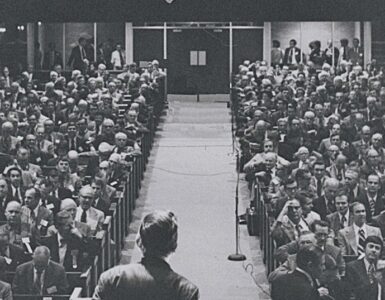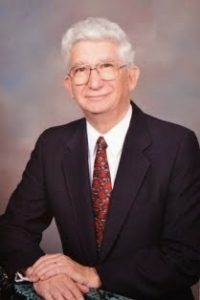 It started in the Garden of Eden. The serpent was craftier than all the other creatures and he used his skills when he asked Eve in Genesis 3:1, “Yeah, hath God said?” When God presented our first parents with the law against eating the fruit of the tree of the knowledge of good and evil, Satan cleverly questioned the truth of what God had said. As Solomon says, “There is nothing new under the sun.” Man, as male and female, has been questioning the truth of God’s revealed word ever since. Whether it was Israel’s skepticism regarding Moses’s authority as the voice of the Lord; God using an astute donkey to speak to not so astute Baalam; or the Lord sending Jonah into the digestive tract of a great fish to convince him to preach to Nineveh; “Yeah, hath God said?” has continued its doubting trail through Scripture and into church history. Challenges to the doctrines of inspiration, infallibility, inerrancy, and whether the Scripture is the very word of God have both fused and fractured Christianity throughout its history. Paul G. Settle found himself within a controversy that he grasped was simply the same thing all over again, “Yeah, hath God said?”
It started in the Garden of Eden. The serpent was craftier than all the other creatures and he used his skills when he asked Eve in Genesis 3:1, “Yeah, hath God said?” When God presented our first parents with the law against eating the fruit of the tree of the knowledge of good and evil, Satan cleverly questioned the truth of what God had said. As Solomon says, “There is nothing new under the sun.” Man, as male and female, has been questioning the truth of God’s revealed word ever since. Whether it was Israel’s skepticism regarding Moses’s authority as the voice of the Lord; God using an astute donkey to speak to not so astute Baalam; or the Lord sending Jonah into the digestive tract of a great fish to convince him to preach to Nineveh; “Yeah, hath God said?” has continued its doubting trail through Scripture and into church history. Challenges to the doctrines of inspiration, infallibility, inerrancy, and whether the Scripture is the very word of God have both fused and fractured Christianity throughout its history. Paul G. Settle found himself within a controversy that he grasped was simply the same thing all over again, “Yeah, hath God said?”
Pastor Settle’s years of ministry required many duties. He was an elder, husband, pastor, father, preacher, counsellor, broadcaster, writer, teacher, seminary professor, administrator, coordinator, moderator, apologist, shepherd, and editor. One publication for which he was an editor was Contact: Presbyterian Churchmen United, which ran 1970-1973. In one of his own articles he clearly expressed the issue at the heart of the controversy among Presbyterians that would lead to founding the Presbyterian Church in America (PCA) in 1973. The title was, “The Underlying Issue,” and apologist Settle, after an introductory paragraph simply takes readers back to those familiar words of Genesis 3, “Yeah, hath God said?”
Has God spoken? Has He caused His mind and will for the Church to be committed to writing? Do the words of the Bible—in their construction and combination with relevant words, clauses, sentences—represent God’s very own revelation to mankind?
Settle then turned to his denominational secondary standards, the Westminster Confession of Faith as well as historically to pastor-teacher John Calvin to buttress his case.
There can be no doubt that the Westminster Confession of Faith gives a clear, affirmative answer to such questions. There can be no doubt, further, that the Bible’s own testimony to the Scriptures is that they, in their entirety (all 66 books), and in detail (all the words) are the very Word of God. As John Calvin says, “the Scriptures are the only records in which God has been pleased to consign His truth … The full authority which they ought to possess with the faithful is not recognized unless they are believed to have come from heaven, as directly as if God had been heard giving utterance to them.” (Institutes of the Christian Religion, book 1, chapter 7, section 1, i.e., most often cited thus, 1:7:1)
This is the view of the Bible which God’s people have firmly held since the beginning. And no wonder, since God’s people believe the Bible (Westminster Confession 16:2) teaches that it is directly inspired by the Holy Spirit. This inspiration was such a superintendence of the Holy Spirit over the writers of the Scriptures, that their writings possess Divine authority and trustworthiness, and are therefore free from error.
After paragraphs addressing the situation within his denomination concerning false views published in denominational literature and taught by denominational leaders, he came to conclude that:
We must be led by God alone. We can be assured that we are led by God only when our lives are ordered by the infallible standard of the Bible, the true Word of God. We trust only the living God, who speaks the truth.
When the General Assembly, synods, presbyteries, sessions, and individual churchmen begin to insist that their members and brethren take seriously the Biblical and Confessional view of Scripture, then the issue will be settled, and we will have a large measure of peace in the Church. But not until then. Peace will not be enjoyed until purity is secured. And purity cannot be had until all the life of the Church is shaped by the living Word of God—the Holy Scriptures.
So, “Yeah, hath God Said?” was at the heart of the issues of the day. Settle confronted the issues directly recognizing that the doctrine of Scripture were at the center of debate, but more importantly, he affirmed revealed religion saying, “Yeah, God hath said!”
The author of Presbyterians of the Past over the years had but a few brief conversations with Paul Settle. He was an endearing person and those introduced to him could quickly assess him a kind and friendly man. In the first chapter of the Gospel of John it is revealed that when Jesus called Nathanael to join the twelve, he said of him, “Behold an Israelite indeed, in whom is no guile!” Pastor Settle was a man of no guile who would have fully affirmed Nathanael’s response when he answered Jesus “and said unto him, Rabbi, thou art the Son of God; thou art the King of Israel.”
Dr. Settle’s ministry included pastorates in Texas and South Carolina; terms on boards of educational institutions; working in church and parachurch ministries; editing publications, particularly during the background and formative yeas of the PCA; and he was moderator of the General Assembly in 1980. His publications included Studies in the Catechism: Memory Work Notebook, and for the 25th anniversary of the PCA, To God all Praise and Glory: Under God: Celebrating the Past, Claiming the Future, the Presbyterian Church in America.
Paul Gunter Settle’s life of ministry affirmed that God had truly spoken and what He said is revealed authoritatively in the infallible Word.
Barry Waugh
Notes—The header is from a 1639 edition of the King James Version on Internet Archive. This article was originally posted as a memorial March 21, 2018, then again June 14, 2023 for the 50th anniversary of the PCA, and now seven years after Settle’s death March 19, 2018. Thank you to the personnel of the PCA Historical Center for scanning and digitizing publications including Contact: Presbyterian Churchmen United available on the HC’s website. To read the quotes used above in their original context see Contact for June 1972.


